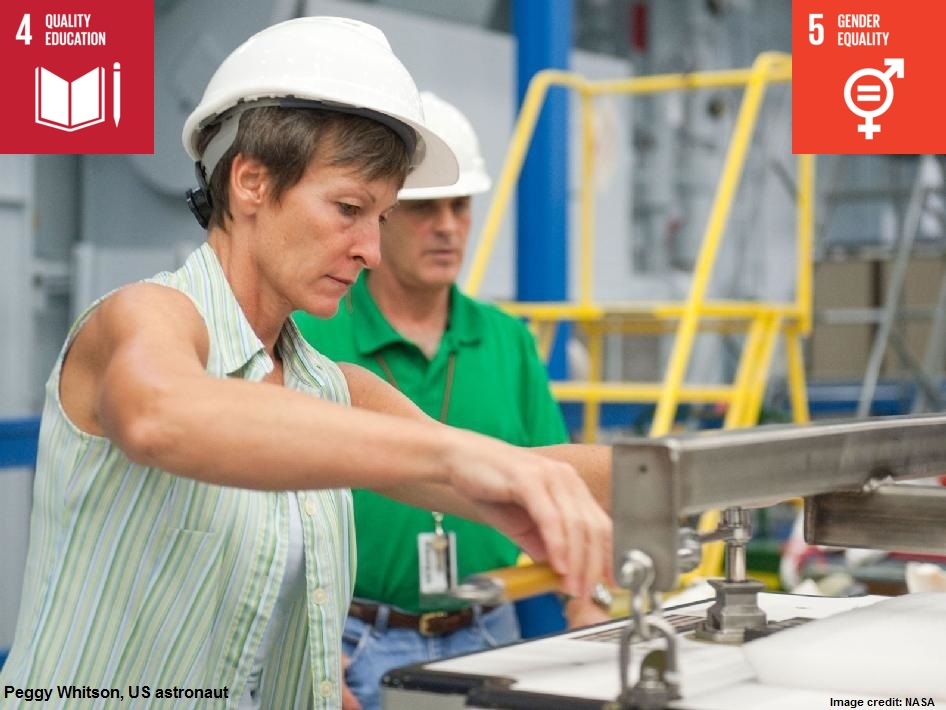
United Nations Expert Meeting on Space for Women
4 - 6 October, 2017, New York, United States of America
Organized jointly by
the United Nations Office for Outer Space Affairs and UN Women
Documents and Links
- Information Note
- Expert Meeting Programme
- Useful Information incl. nearby hotel recommendations
Background
The first United Nations Conference on the Exploration and Peaceful Uses of Outer Space (UNISPACE I) was held in 1968. The year 2018 marked its 50th anniversary (UNISPACE+50), and this was a fitting time to take stock of the contributions of all three UNISPACE conferences, held in 1968, 1982 and 1999 respectively, to global governance of space activities.
At its 59th Session in June 2016, the Committee on the Peaceful Uses of Outer Space endorsed seven thematic priorities for the implementation of UNISPACE+50, including thematic priority 7 (TP7) "capacity-building for the twenty-first century", which is the most cross-cutting aspect of the initiative. Member States seek to define new innovative and effective approaches to overall capacity-building and development needs with a special focus on empowerment of women in developing countries.
UNOOSA has therefore joined forces with UN Women to jointly organize a 'Space for Women' Expert Meeting with the goals of sharing ideas and expertise regarding space and women, enhancing existing partnerships and forging new ones, strengthening and delivering targeted capacity-building and technical advisory activities, and promoting efforts to encourage women and girls' involvement in science, technology, engineering and mathematics (STEM) education.
Objective
- Develop the basis for the "Space for Women" project in support of the implementation of the UNISPACE+50 thematic priority on "Capacity-building for the 21 st century" as well as to address SDG5;
- Strengthen capacity-building activities focusing on women's perspectives in addressing goals and targets enshrined in the interlinked 2030 Agendas, namely the 2030 Agenda for Sustainable Development, the Sendai Framework for Disaster Risk Reduction 2015-2030, and the Paris Climate Agreement;
- Elaborate activities under the "Space for Women" project to help governments to equip and educate themselves regarding the technical and policy capabilities to integrate space technology and applications in their strategic planning towards, and capacity-building for, the implementation of the 2030 Agenda for Sustainable Development, the Sendai Framework for Disaster Risk Reduction 2015-2030, and the Paris Climate Agreement;
- Find new and innovative approaches to address the targets set out in the 2030 Agendas such as the provision of technical assistance, expert assistance, support for research and advisory services, which will enhance operational activity under the Office's Space for Women project;
- Capitalize, through "capacity-building for the twenty-first century" as a cross-cutting thematic priority, on existing the Office projects and programmes, such as the United Nations Platform for Space-based Information for Disaster Management and Emergency Response (UN-SPIDER), or the Office's climate change, space for health, space for agriculture and global navigation satellite systems activities.
Working Modality
The two and half day event brought together decision makers and experts from international organizations, governments and non-governmental organizations as well other high-ranking officials and representatives of the private sector and research institutions to discuss the scope and goals of a 'Space for Women' Project and develop a concrete project together.